初中英语语法大全句子种类
英语中考语法复习——句子种类(特殊句式)
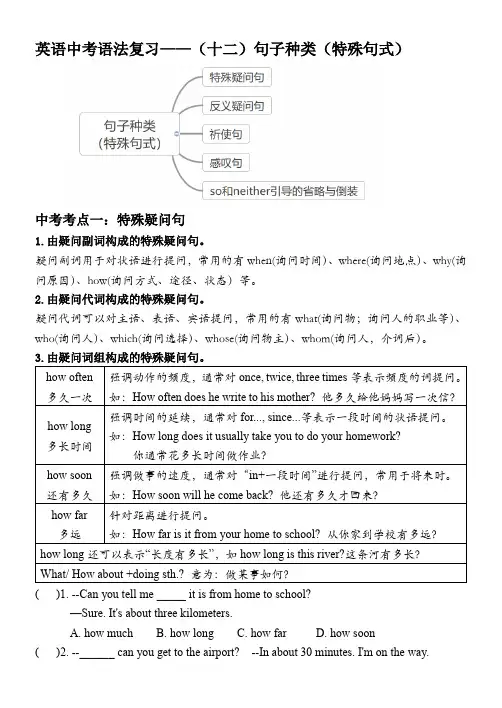
英语中考语法复习——(十二)句子种类(特殊句式)中考考点一:特殊疑问句1.由疑问副词构成的特殊疑问句。
疑问副词用于对状语进行提问,常用的有when(询问时间)、where(询问地点)、why(询问原因)、how(询问方式、途径、状态)等。
2.由疑问代词构成的特殊疑问句。
疑问代词可以对主语、表语、宾语提问,常用的有what(询问物;询问人的职业等)、who(询问人)、which(询问选择)、whose(询问物主)、whom(询问人,介词后)。
how often 多久一次强调动作的频度,通常对once, twice, three times等表示频度的词提问。
如:How often does he write to his mother? 他多久给他妈妈写一次信?how long 多长时间强调时间的延续,通常对for..., since...等表示一段时间的状语提问。
如:How long does it usually take you to do your homework?你通常花多长时间做作业?how soon 还有多久强调做事的速度,通常对“in+一段时间”进行提问,常用于将来时。
如:How soon will he come back? 他还有多久才回来?how far 多远针对距离进行提问。
如:How far is it from your home to school? 从你家到学校有多远?how long还可以表示“长度有多长”,如how long is this river?这条河有多长?What/ How about +doing sth.? 意为:做某事如何?( )1. --Can you tell me _____ it is from home to school?—Sure. It's about three kilometers.A. how muchB. how longC. how farD. how soon( )2. --______ can you get to the airport? --In about 30 minutes. I'm on the way.A. How soonB. How longC. How muchD. How often( )3. --______ have you worked here? —For just one month.A. How oftenB. How longC. How soonD. How much( )4. --We don't have much homework this weekend. Shall we go out together?—OK. What about_______A. to see B seeing C. to see D. sees中考考点二:反义疑问句A. 反义疑问句的标准形式反义疑问句的标准形式是。
初中英语语法大全五种基本句式
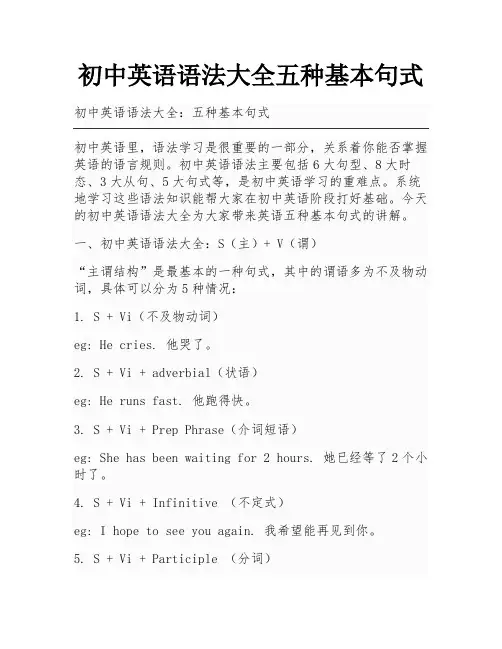
初中英语语法大全五种基本句式初中英语里,语法学习是很重要的一部分,关系着你能否掌握英语的语言规则。
初中英语语法主要包括6大句型、8大时态、3大从句、5大句式等,是初中英语学习的重难点。
系统地学习这些语法知识能帮大家在初中英语阶段打好基础。
今天的初中英语语法大全为大家带来英语五种基本句式的讲解。
一、初中英语语法大全:S(主)+ V(谓)“主谓结构”是最基本的一种句式,其中的谓语多为不及物动词,具体可以分为5种情况:1. S + Vi(不及物动词)eg: He cries. 他哭了。
2. S + Vi + adverbial(状语)eg: He runs fast. 他跑得快。
3. S + Vi + Prep Phrase(介词短语)eg: She has been waiting for 2 hours. 她已经等了2个小时了。
4. S + Vi + Infinitive (不定式)eg: I hope to see you again. 我希望能再见到你。
5. S + Vi + Participle (分词)eg: He enjoys painting. 他喜欢画画。
二、初中英语语法大全:S(主)+ V(谓)+ O(宾)“主谓宾”结构同样可以具体分为5种情况:1. S + Vt + N/Pron.(名词/代词)eg: He is driving a car. 他正在开车。
2. S + Vt + Infinitive(不定式)eg: Jean decided to quit the job. 简决定辞职。
3. S + Vt + Wh-(wh-疑问词)+ Infinitiveeg: He was asking how to make it. 他在问怎么才能做到这一点。
4. S + Vt + Gerund(动名词)eg: He finished reading the book. 他读完了这本书。
5. S + Vt + That-clause(that从句)eg: I feel that he is lying. 我感觉他在撒谎。
英语语法-句子的种类(史上最详细)
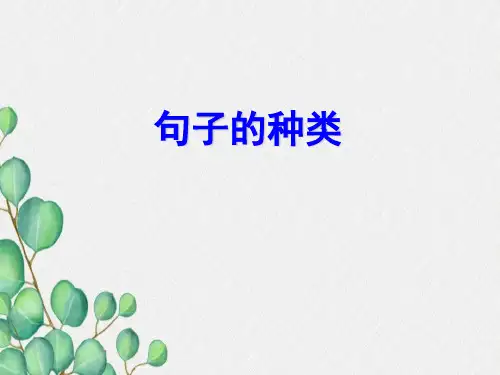
(4) 现在完成时和过去完成时的一般疑问句。 将助动词 have/has /had提至句首。 You have known her since your childhood? Have you known her since your childhood? 你从童年时就认识她吗? Yes I have /No I haven’t He had learned English before he came here? Had he learned English before he came here? 他来这之前就学过英语吗? Yes he had / No he hadn’t.
2.感叹句的种类
感叹句一般用what 或how开头,其具体用法如下:
(1) what引导的感叹句 (中心词是名词)
①What +a/an+ 形容词+可数名词单数(+主语+谓语)!
What a cold day (it is) !
多么冷的一天啊!
What a clever boy (he is)! 多么聪明的男孩!
句子的种类
英语的句子按照用途可分为四类:陈述句、疑问句、祈使 句和感叹句。
(一)陈述句
用来陈述一件事实或表达说话者看法的句子叫作陈述句, 句末用句号表示句子的陈述结束。陈述句分为肯定句和否 定句。 I like apples. 我喜欢苹果。 Tom is not good at English. 汤姆英语学得不好。
(2) 情态动词的一般疑问句。 陈述句中有情态动词,直接将情态动词提至主语前。 You can bring me some bread. Can you bring me some bread? Yes I can / No I can’t I must do it now. Must I do it now? Yes you must / No you need not.
初中英语语法基础 句子结构和类型专题讲解 (附同步练习题无答案)
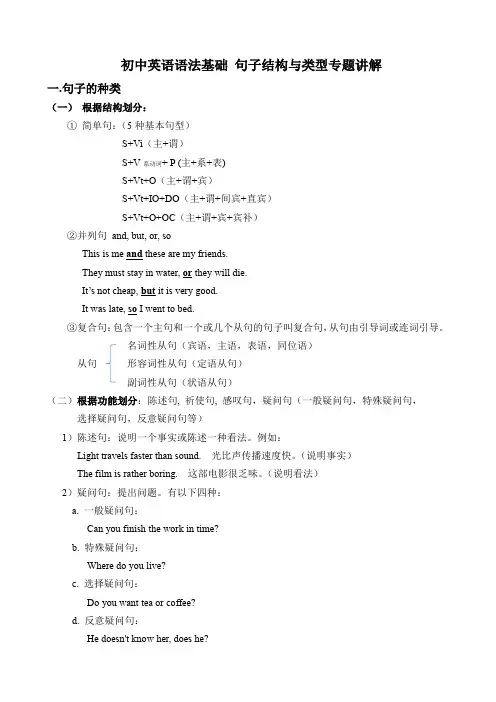
初中英语语法基础句子结构与类型专题讲解一.句子的种类(一)根据结构划分:①简单句:(5种基本句型)S+Vi(主+谓)S+V系动词+ P (主+系+表)S+Vt+O(主+谓+宾)S+Vt+IO+DO(主+谓+间宾+直宾)S+Vt+O+OC(主+谓+宾+宾补)②并列句and, but, or, soThis is me and these are my friends.They must stay in water, or they will die.It’s not cheap, but it is very good.It was late, so I went to bed.③复合句:包含一个主句和一个或几个从句的句子叫复合句,从句由引导词或连词引导。
名词性从句(宾语,主语,表语,同位语)从句形容词性从句(定语从句)副词性从句(状语从句)(二)根据功能划分:陈述句, 祈使句, 感叹句,疑问句(一般疑问句,特殊疑问句,选择疑问句,反意疑问句等)1)陈述句:说明一个事实或陈述一种看法。
例如:Light travels faster than sound.光比声传播速度快。
(说明事实)The film is rather boring.这部电影很乏味。
(说明看法)2)疑问句:提出问题。
有以下四种:a. 一般疑问句:Can you finish the work in time?b. 特殊疑问句:Where do you live?c. 选择疑问句:Do you want tea or coffee?d. 反意疑问句:He doesn't know her, does he?3)祈使句:提出请求,建议或发出命令。
Don't be nervous!Let’s go fishing tomorrow.4)感叹句:表示说话人惊奇、喜悦、愤怒等情绪。
What good news it is ! How beautiful the girl is !二.简单句的基本句型介绍:1. 基本句型一:S+Vi (主+不及物动词)主语:可以作主语的成分有名词,主格代词,动词不定式,动名词等等。
初中英语语法句子的种类
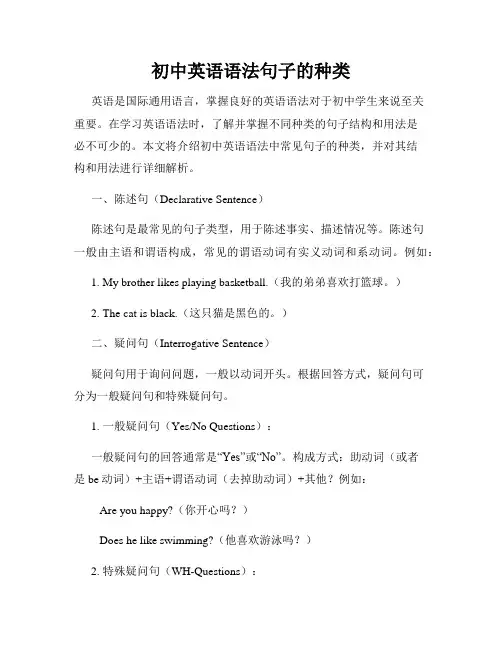
初中英语语法句子的种类英语是国际通用语言,掌握良好的英语语法对于初中学生来说至关重要。
在学习英语语法时,了解并掌握不同种类的句子结构和用法是必不可少的。
本文将介绍初中英语语法中常见句子的种类,并对其结构和用法进行详细解析。
一、陈述句(Declarative Sentence)陈述句是最常见的句子类型,用于陈述事实、描述情况等。
陈述句一般由主语和谓语构成,常见的谓语动词有实义动词和系动词。
例如:1. My brother likes playing basketball.(我的弟弟喜欢打篮球。
)2. The cat is black.(这只猫是黑色的。
)二、疑问句(Interrogative Sentence)疑问句用于询问问题,一般以动词开头。
根据回答方式,疑问句可分为一般疑问句和特殊疑问句。
1. 一般疑问句(Yes/No Questions):一般疑问句的回答通常是“Yes”或“No”。
构成方式:助动词(或者是be动词)+主语+谓语动词(去掉助动词)+其他?例如: Are you happy?(你开心吗?)Does he like swimming?(他喜欢游泳吗?)2. 特殊疑问句(WH-Questions):特殊疑问句通常以疑问词(如what, where, when, why, how等)开头,回答需要提供具体信息。
例如:What is your name?(你叫什么名字?)Where does she live?(她住在哪儿?)三、祈使句(Imperative Sentence)祈使句用于表达请求、命令或建议等,一般省略主语。
常用动词原形构成祈使句,例如:1. Sit down, please.(请坐。
)2. Don't be late for class.(上课不要迟到。
)四、感叹句(Exclamatory Sentence)感叹句用于表达强烈的感情或情绪。
常常以感叹词(如how, what 等)开头。
初中英语语法大全-句子种类
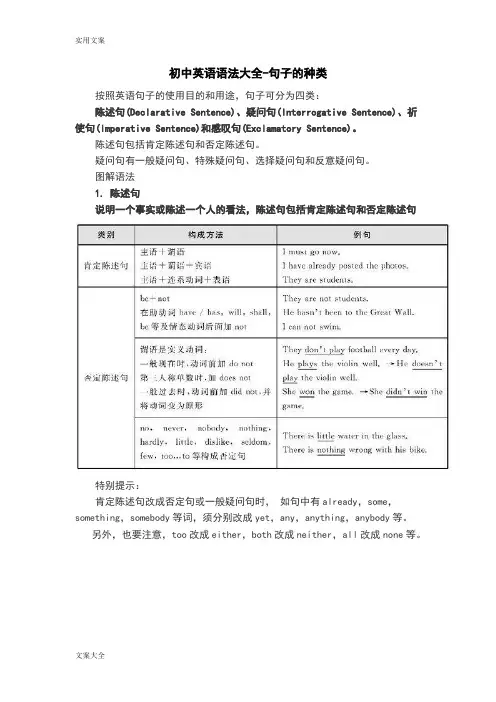
初中英语语法大全-句子的种类按照英语句子的使用目的和用途,句子可分为四类:陈述句(Declarative Sentence)、疑问句(Interrogative Sentence)、祈使句(Imperative Sentence)和感叹句(Exclamatory Sentence)。
陈述句包括肯定陈述句和否定陈述句。
疑问句有一般疑问句、特殊疑问句、选择疑问句和反意疑问句。
图解语法1. 陈述句说明一个事实或陈述一个人的看法,陈述句包括肯定陈述句和否定陈述句特别提示:肯定陈述句改成否定句或一般疑问句时,如句中有already,some,something,somebody等词,须分别改成yet,any,anything,anybody等。
另外,也要注意,too改成either,both改成neither,all改成none等。
2. 疑问句3. 常用的特殊疑问句4. 特殊的反意疑问句①主句是祈使句时,“will you?”意为“请求”,“won’t you?”表示提醒对方注意。
例句:Look at the blackboard, will you / won’t you?Don’t be late again, will you?②感叹句后的反意疑问,用一般现在时态的否定形式例句:What fine weather, isn’t it?How beautifully she sings, doesn’t she?③陈述部分是“I am …”时,用“aren’t I?”而不用“am not I?”例句:I'm working now, aren’t I?④陈述部分主语是everything,nothing,anything或something 时,疑问句主语用it例句:Something is wrong with my radio, isn’t it?Nothing is difficult, is it?⑤陈述部分的主语是somebody, nobody, everybody, anybody, no one,none, neither 时,疑问句的主语用they例句:Everyone is here, aren’t they?No one knows about it, do they?⑥陈述部分的主语是:1) this或that时,问句的主语用it2) these或those时,问句主语用they3) there be句时,反意疑问句中用there例句:This is a plane, isn’t it?These are grapes, aren’t they?There was a hospital here, wasn’t there?⑦陈述部分的主语是one时,问句的主语可用one,也可用you (美语用he)例句:One should be ready to help others, shouldn’t one?⑧陈述句中有few, seldom, never hardly,not,rarely,no,nobody,too…to等时,疑问句部分用肯定结构;如由前后缀构成否定词,疑问句部分仍用否定结构例句:He is never late for school, is he?You got nothing from him, did you?It is useless, isn’t it?⑨陈述部分主语是从句、不定式(短语)、动词-ing形式时,疑问句的主语用it例句:What you need is more important, isn’t it?⑩陈述部分由think, believe, suppose, imagine等引导的宾语从句:1) 主语是第一人称时,问句与从句的主谓语一致2) 主语是其他人称,问句与主句的主谓语一致例句:I think he will come, won’t he?I don’t think he can pass the exam, can he?He believed you had seen her before, didn’t he?? have是实义动词时,疑问句用助动词do,does,did;have 是助动词,则不然例如:They had a meeting just now, didn’t they?She’s been to many places of interest, hasn’t she?? 陈述部分有have /has /had to 时,疑问句要用助动词的否定形式例句:You have to water the vegetables now, don’t you?? 陈述部分有had better时,疑问句中用hadn’t刘局:We had better go to school at once, hadn’t we?? 陈述部分有must:1) 作“一定;必须”解释时,疑问句用mustn’t或needn’t;2) 表示推测,作“一定是;必定”解释时,疑问句需根据其后的动词原形选用相应的形式;3) 对过去动作推测时,问句的助动词用did或have;4) 对过去的状态推测时,问句的be用was例句:He must work hard at physics, mustn’t he?You must go to Guangzhou, needn’t you?You mustn’t smoke here, must you?Tom must be at home, isn’t he?She must have finished her work, hasn’t/didn’t she?He must have been a policeman, wasn’t he?? 陈述部分有ought to,used to,疑问句要用 shouldn’t,usedn’t / didn’t例句:Jill used to be a teacher, usedn’t / didn’t she?? 陈述句部分是复合句时,疑问句的主语和助动词要与主句一致例句:He was reading when the teacher came in, wasn’t he?特别提示:反意疑问句是“否定陈述句+肯定问句”时,如回答内容是肯定的,用“Yes+肯定结构”,反之,用“No+否定结构”。
初中英语语法大全-句子种类
初中英语语法大全-句子的种类按照英语句子的使用目的和用途,句子可分为四类:陈述句(Declarative Sentence)、疑问句(Interrogative Sentence)、祈使句(Imperative Sentence)和感叹句(Exclamatory Sentence)。
陈述句包括肯定陈述句和否定陈述句.疑问句有一般疑问句、特殊疑问句、选择疑问句和反意疑问句。
图解语法1。
陈述句说明一个事实或陈述一个人的看法,陈述句包括肯定陈述句和否定陈述句特别提示:肯定陈述句改成否定句或一般疑问句时,如句中有already,some,something,somebody等词,须分别改成yet,any,anything,anybody等。
另外,也要注意,too改成either,both改成neither,all改成none等。
2. 疑问句3. 常用的特殊疑问句4. 特殊的反意疑问句①主句是祈使句时,“will you?"意为“请求",“won't you?”表示提醒对方注意。
例句:Look at the blackboard, will you / won’t you?Don’t be late again, will you?②感叹句后的反意疑问,用一般现在时态的否定形式例句:What fine weather, isn’t it?How beautifully she sings, doesn’t she?③陈述部分是“I am …”时,用“aren’t I?"而不用“am not I?”例句:I'm working now, aren’t I?④陈述部分主语是everything,nothing,anything或something 时,疑问句主语用it例句:Something is wrong with my radio, isn’t it?Nothing is difficult, is it?⑤陈述部分的主语是somebody, nobody, everybody, anybody, no one, none, neither 时,疑问句的主语用they例句:Everyone is here, aren't they?No one knows about it, do they?⑥陈述部分的主语是:1) this或that时,问句的主语用it2) these或those时,问句主语用they3) there be句时,反意疑问句中用there例句:This is a plane, isn’t it?These are grapes, aren’t they?There was a hospital here, wasn’t there?⑦陈述部分的主语是one时,问句的主语可用one,也可用you (美语用he)例句:One should be ready to help others, shouldn't one?⑧陈述句中有few, seldom, never hardly,not,rarely,no,nobody,too…to等时,疑问句部分用肯定结构;如由前后缀构成否定词,疑问句部分仍用否定结构例句:He is never late for school, is he?You got nothing from him, did you?It is useless, isn’t it?⑨陈述部分主语是从句、不定式(短语)、动词-ing形式时,疑问句的主语用it例句:What you need is more important, isn’t it?⑩陈述部分由think, believe, suppose, imagine等引导的宾语从句:1) 主语是第一人称时,问句与从句的主谓语一致2) 主语是其他人称,问句与主句的主谓语一致例句:I think he will come, won’t he?I don’t think he can pass the exam, can he?He believed you had seen her before, didn’t he?? have是实义动词时,疑问句用助动词do,does,did;have 是助动词,则不然例如:They had a meeting just now, didn’t they?She’s been to many places of interest, hasn't she??陈述部分有have /has /had to 时,疑问句要用助动词的否定形式例句:You have to water the vegetables now, don’t you?? 陈述部分有had better时,疑问句中用hadn’t刘局:We had better go to school at once, hadn’t we?? 陈述部分有must:1) 作“一定;必须”解释时,疑问句用mustn’t或needn’t;2) 表示推测,作“一定是;必定"解释时,疑问句需根据其后的动词原形选用相应的形式;3) 对过去动作推测时,问句的助动词用did或have;4) 对过去的状态推测时,问句的be用was例句:He must work hard at physics, mustn’t he?You must go to Guangzhou, needn’t you?You mustn’t smoke here, must you?Tom must be at home, isn’t he?She must have finished her work, hasn’t/didn’t she?He must have been a policeman, wasn’t he??陈述部分有ought to,used to,疑问句要用 shouldn’t,usedn’t / didn’t例句:Jill used to be a teacher, usedn’t / didn’t she??陈述句部分是复合句时,疑问句的主语和助动词要与主句一致例句:He was reading when the teacher came in, wasn't he?特别提示:反意疑问句是“否定陈述句+肯定问句”时,如回答内容是肯定的,用“Yes+肯定结构”,反之,用“No+否定结构”。
英语语法句子种类
英语语法句子种类
英语语法中常见的句子种类包括:
1. 陈述句(declarative sentence):陈述句是表达一个声明、陈述或描述的句子,通常以句号结尾。
例:I like to read books.(我喜欢阅读书籍。
)
2. 疑问句(interrogative sentence):疑问句用于提出问题,通常以问号结尾。
例:Do you like ice cream?(你喜欢冰淇淋吗?)
3. 感叹句(exclamatory sentence):感叹句用于表达强烈的感情或情绪,通常以感叹号结尾。
例:What a beautiful sunset!(多么美丽的日落啊!)
4. 祈使句(imperative sentence):祈使句用于表达请求、命令、建议或要求,通常省略了主语,动词在前。
例:Please close the window.(请关上窗户。
)
5. 条件句(conditional sentence):条件句用于表达假设、条件或推断,并包含主从句。
例:If it rains, we will stay indoors.(如果下雨,我们就会呆在室内。
)
例:I like to read books, and he prefers to watch movies.(我喜欢阅读书籍,他更喜欢看电影。
)
例:She is studying English because she wants to improve her job prospects.(她正在学习英语,因为她想提高工作前景。
)以上是英语语法中常见的句子种类,每种句子种类都有其特定的用途和结构。
英语语法句子的种类
英语语法句子的种类一、陈述句陈述句是最常见的句子类型,用于陈述事实、描述情况或表达观点。
例句:- I go to school every day.- She is a doctor.- They live in New York.二、疑问句疑问句用于询问信息、寻求答案或确认事实。
例句:- Do you like pizza?- Where is the nearest post office?- Did you see the movie?三、祈使句祈使句用于表达请求、命令、建议或劝告。
例句:- Please close the door.- Don't forget to bring your umbrella.- Let's go for a walk.四、感叹句感叹句用于表达惊讶、赞美、失望或其他强烈的情感。
例句:- What a beautiful sunset!- How delicious the food is!- I can't believe we won the game!五、条件句条件句用于表达条件和结果之间的关系。
例句:- If it rains, we will stay indoors.- Unless you study hard, you will fail the exam.六、比较句比较句用于表示两个或多个事物之间的比较。
例句:- John is taller than Peter.- She sings better than him.- I prefer coffee to tea.七、否定句否定句用于否定陈述句中的内容。
例句:- I didn't see him at the party.- She doesn't like spicy food.- They haven't visited that museum before.。
【初中英语】初中英语句子种类的语法大全
【初中英语】初中英语句子种类的语法大全
【—句子种类的】句子的种类一般分为简单句、并列句和复合句及其它一些特殊的疑
问句的介绍。
(一)句子可以分为疑问句和感叹句
1)陈述句(declarativesentences):说明一个事实或陈述一种看法。
光速比音速慢。
光比声音传播得快。
(陈述事实)
thefilmisratherboring. 这部电影很乏味。
(评论)
2)疑问句(interrogativesentences):提出问题。
有以下四种:
a、一般问题:
canyoufinishtheworkintime?
你能按时完成工作吗?
b. 特殊疑问句(wquestions;hquestions):
你住在哪里?你住在哪里?
howdoyouknowthat?你怎么知道那件事?
c、备选问题:
doyouwantteaorcoffee?
你想要茶还是咖啡?
d. 反意疑问句(tag-questions):
他不认识她,是吗?
他不认识她,对不对?
3)祈使句:提出请求、建议或下命令,例如:
sitdown,please. 请坐。
别害怕!别紧张!
4)感叹句(exclamatorysentences):表示说话人惊奇、喜悦、愤怒等情绪,例如:
什么鬼新闻!好消息!。
- 1、下载文档前请自行甄别文档内容的完整性,平台不提供额外的编辑、内容补充、找答案等附加服务。
- 2、"仅部分预览"的文档,不可在线预览部分如存在完整性等问题,可反馈申请退款(可完整预览的文档不适用该条件!)。
- 3、如文档侵犯您的权益,请联系客服反馈,我们会尽快为您处理(人工客服工作时间:9:00-18:30)。
初中英语语法大全-句子的种类按照英语句子的使用目的和用途,句子可分为四类:陈述句(Declarative Sentence)、疑问句(Interrogative Sentence)、祈使句(Imperative Sentence)和感叹句(Exclamatory Sentence)。
陈述句包括肯定陈述句和否定陈述句。
疑问句有一般疑问句、特殊疑问句、选择疑问句和反意疑问句。
图解语法1. 陈述句说明一个事实或陈述一个人的看法,陈述句包括肯定陈述句和否定陈述句特别提示:肯定陈述句改成否定句或一般疑问句时,如句中有already,some,something,somebody等词,须分别改成yet,any,anything,anybody等。
另外,也要注意,too改成either,both改成neither,all改成none等。
2. 疑问句3. 常用的特殊疑问句4. 特殊的反意疑问句①主句是祈使句时,“will you”意为“请求”,“won’t you”表示提醒对方注意。
例句:Look at the blackboard, will you / won’t youDon’t be late again, will you②感叹句后的反意疑问,用一般现在时态的否定形式例句:What fine weather, isn’t itHow beautifully she sings, doesn’t she③陈述部分是“I am …”时,用“aren’t I”而不用“am not I”例句:I'm working now, aren’t I④陈述部分主语是everything,nothing,anything或something 时,疑问句主语用it例句:Something is wrong with my radio, isn’t itNothing is difficult, is it⑤陈述部分的主语是somebody, nobody, everybody, anybody, no one,none, neither 时,疑问句的主语用they例句:Everyone is here, aren’t theyNo one knows about it, do they⑥陈述部分的主语是:1) this或that时,问句的主语用it2) these或those时,问句主语用they3) there be句时,反意疑问句中用there例句:This is a plane, isn’t itThese are grapes, aren’t theyThere was a hospital here, wasn’t there⑦陈述部分的主语是one时,问句的主语可用one,也可用you (美语用he)例句:One should be ready to help others, shouldn’t one⑧陈述句中有few, seldom, never hardly,not,rarely,no,nobody,too…to等时,疑问句部分用肯定结构;如由前后缀构成否定词,疑问句部分仍用否定结构例句:He is never late for school, is heYou got nothing from him, did youIt is useless, isn’t it⑨陈述部分主语是从句、不定式(短语)、动词-ing形式时,疑问句的主语用it例句:What you need is more important, isn’t it⑩陈述部分由think, believe, suppose, imagine等引导的宾语从句:1) 主语是第一人称时,问句与从句的主谓语一致2) 主语是其他人称,问句与主句的主谓语一致例句:I think he will come, won’t heI don’t think he can pass the exam, can heHe believed you had seen her before, didn’t hehave是实义动词时,疑问句用助动词do,does,did;have 是助动词,则不然例如:They had a meeting just now, didn’t theyShe’s been to many places of interest, hasn’t she陈述部分有have /has /had to 时,疑问句要用助动词的否定形式例句:You have to water the vegetables now, don’t you陈述部分有had better时,疑问句中用hadn’t刘局:We had better go to school at once, hadn’t we陈述部分有must:1) 作“一定;必须”解释时,疑问句用mustn’t或needn’t;2) 表示推测,作“一定是;必定”解释时,疑问句需根据其后的动词原形选用相应的形式;3) 对过去动作推测时,问句的助动词用did或have;4) 对过去的状态推测时,问句的be用was例句:He must work hard at physics, mustn’t heYou must go to Guangzhou, needn’t youYou mustn’t smoke here, must youTom must be at home, isn’t heShe must have finished her work, hasn’t/didn’t sheHe must have been a policeman, wasn’t he陈述部分有ought to,used to,疑问句要用 shouldn’t,usedn’t / didn’t例句:Jill used to be a teacher, usedn’t / didn’t she陈述句部分是复合句时,疑问句的主语和助动词要与主句一致例句:He was reading when the teacher came in, wasn’t he特别提示:反意疑问句是“否定陈述句+肯定问句”时,如回答内容是肯定的,用“Yes+肯定结构”,反之,用“No+否定结构”。
译成汉语时,要将“Yes”译成“不是”,“No”译成“是的”。
例如:— You won’t be away for long, will you 你不会离开太久,是吗— Yes, I will. 不,我会离开很久。
(事实是会离开很久)— No, I won’t. 是的,我不会离开很久。
(事实是不会离开很久)Let’s go home, shall we 回家吧,好吗(包括说话人)Let me have a try, will you 让我试一试,行吗(不包括说话人)注意判别:'s是has和is与主语的缩略形式,'d是would和had与主语的缩略形式。
例如:He’s going to play basketball, isn’t heShe’s been to Beijing many times, hasn’t sheYou’d better tell him about it at once, hadn’t youThey’d like something delicious to eat, wouldn’t they5. 祈使句表示请求、命令、劝告、建议、号召等的句子,常省略主语you,句首用动词原形。
①肯定祈使句:动词原形+其他成分,如:Listen to me carefully.②否定祈使句:Don’t (never)+动词原形+其他成分,如:Don’t be late for class next time.Don’t do that again.Never leave today’s work for tomorrow.③ Let引导的祈使句 Let +第一、三人称+(not)动词原形,表示建议做某事,如:Let me try again.Let Jack wait a minute.④祈使句的强调语气 Do+动词原形+其他成分,如:Do come back at once!Do be careful.⑤祈使句的特殊形式:1) No+名词/动名词+其他2) None+of介词短语3) 祈使句+and+简单句,表示“如果……就……”4) 祈使句+or+简单句,表示“……否则……”5) 在祈使句后面,加一个问句,使语气更加委婉例句:No smoking! 请勿吸烟!None of your nonsense!Go down the street, and you’ll see a cinema. 沿着这条街走,你就会看到一家电影院。
Be quick, or we’ll be late. 快点,否则我们要迟到了。
Don’t tell anyone, will you 不要告诉任何人,好吗6. 感叹句表达喜、怒、哀、乐等强烈感情的句子叫作感叹句。
感叹句的主谓语可以省略,句末用感叹号“!”,常用what或how来引导。
what 修饰名词,how 修饰形容词、副词。
初中英语语法大全句子种类。
